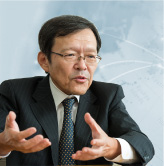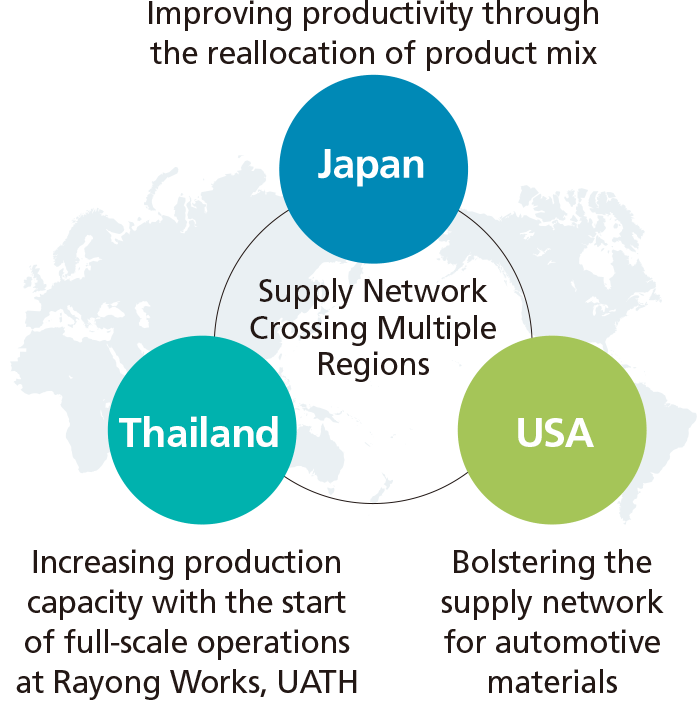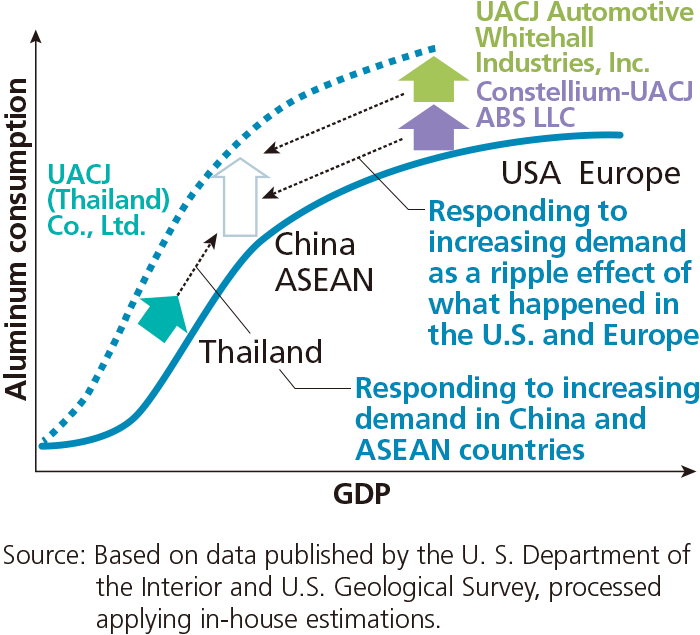Global Strategy
Accelerate interactive communication and
positively seize new business opportunities
as a true global player.
 Takayoshi NakanoDirector, Member of the Board Senior Managing Executive Officer Responsible for Global Business Strategy Department and Public and Investor Relations Department
Takayoshi NakanoDirector, Member of the Board Senior Managing Executive Officer Responsible for Global Business Strategy Department and Public and Investor Relations Department
“Developing business in newly emerging economies’” and “Making vehicles lighter” are driving new growth in the aluminum market
The business environment in the aluminum industry is in a period of big change. One of the factors is that more and more customers are globalizing their business operations. Major buyers of aluminum in industries, such as automobile, machinery, electronics and beverage cans, are developing manufacturing bases not only in Japan, but also throughout major parts of the world, including Europe, America, China and other Asian countries. Consequently, we, as an aluminum manufacturer, are following this movement, and have established a network to ensure the stable supply of “aluminum products of the same quality anywhere in the world.”
Within the global market, there are a number of newly emerging markets, such as those in Southeast Asian countries, with enormous potential for growth. Aluminum consumption correlates to the GDP of the region. Therefore, as newly emerging countries in Southeast Asia, India, the Middle East and Africa expand their economic development, living standards improve and the demand for aluminum will no doubt increase remarkably as well.
Meanwhile, the trend to “Make vehicles lighter,” is creating new growth areas developed markets as well. Amidst increasingly stricter environmental regulations, automobile manufacturers around the world are actively working to achieve lighter vehicle bodies for the purpose of improving fuel efficiency and obtaining better mileage performance from electric vehicles. Aluminum being lighter than steel, the transition towards its use for ABS and structural materials is an effective means of reducing vehicle weight. Moreover, unlike the past, the use of aluminum is no longer limited to a few luxury vehicles, and is now expanding to popular mass-produced vehicles such as pick-up trucks, which are a favorite means of transportation the U.S. Considering the long 100-year or more history of using steel for ABS and structural materials since first beginning mass production of the automobile, the current trend towards lighter vehicles is a golden opportunity for the aluminum industry.
The foremost objective of establishing UACJ by integrating the operations of Japan’s top two companies in the aluminum rolling industry was to accurately grasp such changes in the global market environment and lead this new business opportunity to sustainable growth. A fact that you may be aware of, aluminum manufacturing is an equipment-intensive industry and competitiveness in the market is largely dependent upon economies of scale. The establishment of a three-pronged global supply network with hubs in Japan, North America and Thailand, in addition to integrating our two former companies, has realized the world’s leading annual production capacity of over one million tons; thereby providing us with a powerful weapon for competing in the global market.
To respond to growing local demand for aluminum in the Southeast Asian region where remarkable economic development is taking place, we pushed forward with bolstering production at the Rayong Works of UATH in Thailand. In August 2015, we completed construction and started operations of a fully-integrated manufacturing system capable of producing 200,000 tons a year. Our plan is to continue bolstering its production capacity as a key point in the global supply network. Furthermore, to strengthen our business structure in the U.S. market, which leads in environmental regulations for automobiles, we are investing proactively. This has included establishing a joint venture to undertake the production and sales of ABS, the acquisition of a leading manufacturer that develops automotive aluminum structural materials, and reinforcement of the local supply network for aluminum base materials among others.


Pursuing globalization with an emphasis on diversity through dynamic interactive communication
In this way, the proactive capital investments and mergers and acquisitions following the integration period are steadily strengthening UACJ’s global business structure. However, for the company to compete evenly as a true global player with other international aluminum manufacturers, the reinforcement of organizational management on a global scale is essential, as well as the pursuit of upgrading of business.
“Interactive communication” has been an important keyword to keep our new global businesses in Thailand, U.S., and other regions on track, and to seize other business opportunities as shown in the growth of markets in Southeast Asia and the trend for lighter automobiles. We are an aluminum business group of Japanese origin, but we know that satisfactory results could never have been obtained by holding onto “one-way globalization” and simply utilizing the Japanese way of business and manufacturing techniques.
What is important is carefully explaining the UACJ corporate philosophy, its business strategy, and the advantages of manufacturing the Japanese way so that they are clearly understood, as well as deepening our understanding of the local business and working styles in order to utilize mutually beneficial points. Properly applying interactive communication, A+B no longer equals AB, but creates a higher value, C, through the fusion and harmony of different cultures, senses of value and business styles. This is where dialectical globalization is realized.
Through such interactive communication, the UACJ Group will continue to work towards further globalization of a new era, emphasizing diversity in world markets and achieving sustainable growth as a major aluminum group in a true sense.
